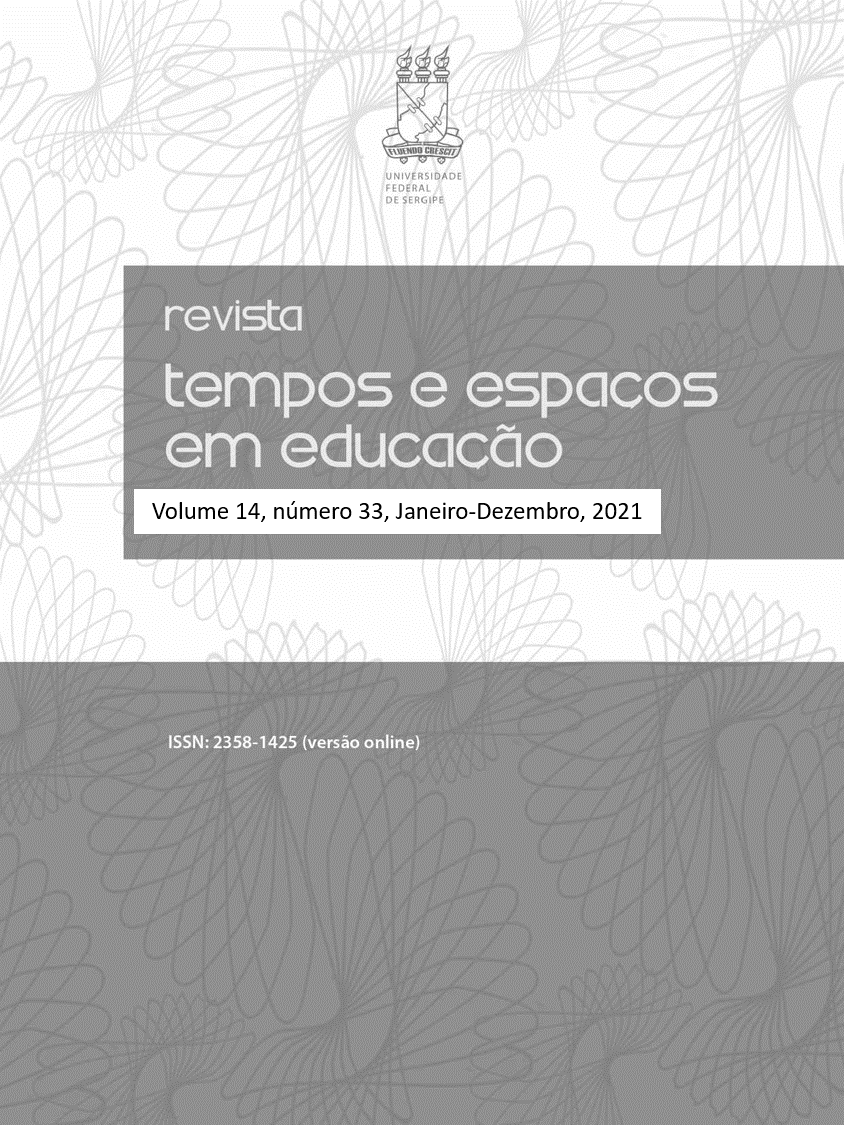Formato baseado em clube de ensino de russo como língua estrangeira para estudantes chineses
DOI:
https://doi.org/10.20952/revtee.v14i33.15526Palavras-chave:
Aprendendo, Componente regional, Russo como língua estrangeira, Tecnologias baseadas em clube, Universidade federalResumo
O estudo trata da questão da aplicação do formato de clube comunicativo para a organização de atividades recreativas, educacionais e culturais para estudantes estrangeiros interessados na língua russa. Os autores descrevem o modelo estrutural e de conteúdo do clube de comunicação russo-chinês de língua russa Almaz, criado com base nos centros de língua, literatura e cultura russas da Universidade Federal do Nordeste Ammosov. O modelo inclui componentes de destino, tecnológicos e de conteúdo e mecanismos de implementação. Os autores concluem que as tecnologias interativas de lazer apresentam grande potencial para desenvolver a competência comunicativa e as habilidades criativas de estudantes estrangeiros e enriquecer o indivíduo com o conhecimento sobre a cultura tradicional dos povos que habitam o território multicultural da Rússia.
Downloads
Referências
Anderson, J., & Guan, Y. (2017). Implicit Acculturation and the Academic Adjustment of Chinese Student Sojourners in Australia. Australian Psychologist, 53(3), 1–9. https://doi.org/10.1111/ap.12332
Brito, R. S., Prado, J. R., & Nunes, C. P. (2017). As condições de trabalho docente e o pós-estado de bem-estar social. Revista Tempos e Espaços em Educação, 10(23), 165-174. https://doi.org/10.20952/revtee.v10i23.6676
Bukhtiarova, E. Yu. (2020). Novye tekhnologii v sisteme nepreryvnogo dopolnitelnogo obrazovaniya v professionalnom razvitii pedagoga [New technologies in the system of continuous additional education in the pedagogue's professional development]. Mir nauki, kultury i obrazovaniya, 5(84), 17–19. https://doi.org/10.24411/1991-5497-2020-00856
Cgtn. (2019). Why China can give every child equal access to education. Available: https://news.cgtn.com/news/3d3d514f7851444d35457a6333566d54/index.html
Dergaeva, S. S. (2017). Dopolnitelnoe yazykovoe obrazovanie. Klub angliiskogo yazyka [Additional linguistic education. English language club]. Alma mater (Vestnik vysshei shkoly), 7, 112–117.
Druzhinina, R. V. (2018). O putyakh razvitiya professionalno znachimykh umenii studentov pri obuchenii inostrannomu yazyku v programmakh podgotovki menedzherov [Ways of developing professionally significant skills of students when teaching a foreign language in manager training programs]. Inostrannye yazyki: lingvisticheskie i metodicheskie aspekty, 41, 26–31.
Khlystov, Y. (2016). Chinese education: students, teachers, and methodology. Laowaicareer. Available: https://www.laowaicareer.com/blog/chinese-pop-culture-every-teacher-know/
Machekhina, O. N. (2017). Srednyaya shkola v Yaponii [Middle school in Japan]. Pedagogicheskii zhurnal Bashkortostana, 1(68), 37–44.
Novikov, A. M. (2006). Formy obucheniya v sovremennykh usloviyakh [Forms of education in the modern conditions]. Spetsialist, 1, 27–31.
Shapovalova, P. V. (2014). Klubnaya forma organizatsii obucheniya kak naibolee effektivnyi metod formirovaniya lingvokulturnoi kompetentsii [Club-based form of organizing education as the most efficient method of forming the linguocultural competence]. In: Malysheva, N. V. (Ed.). Ammosov-2014: collected proceedings of the all-Russian scientific and practical conference within the framework of the Forum of the Scientific Youth of Federal Universities, Ammosov NEFU, September 15-19, 2014, Yakutsk, Russia. Kirov: International Center for Research Projects, pp. 722–728.
Silva, L. R., Santos, A. R., & Santos, I. T. R. (2020). Public policies for education of/in the field and the school environment in a settlement of the MST: the intimate relationship with the pedagogical policy. Journal of Research and Knowledge Spreading, 1(1), e11737. http://dx.doi.org/10.20952/jrks1111737
Tanikawa, M. (2003). Free to Be. The New York Times. Available: https://www.nytimes.com/2003/01/12/education/free-to-be.html
Torshina, A. V. (2017). Evolyutsiya ponyatiya "klubnaya deyatelnost" v istoriko-pedagogicheskom protsesse [Evolution of the notion "club activity" in the historical and pedagogical process]. In: Kaynova, G. A., Akhmetov, I. G. (Eds.). Aspekty i tendentsii pedagogicheskoi nauki: proceedings of the 2nd International scientific conference, July 20-23, 2017, St. Petersburg, Russia. St. Petersburg: Svoe izdatelstvo, pp. 10–13. Available: https://moluch.ru/conf/ped/archive/216/12645/
Tregub, T. V. (2017). Teatralizovannyi spektakl na inostrannom yazyke dlya podrostkov v ramkakh tvorcheskoi masterskoi yazykovogo kluba. Analiz effektivnosti uchebnogo i motivatsionnogo komponentov [Theatrical play in a foreign language for teenagers within the framework of the creative workshop of a language club. Analyzing the efficiency of the educational and motivational components]. Sovremennye tendentsii razvitiya nauki i tekhnologii, 1-8, 145–149.
Zhu, J. (2016). Chinese Overseas Students and Intercultural Learning Environments. Academic Adjustment, Adaptation and Experience. London: Palgrave Macmillan, 259 р.
Downloads
Publicado
Como Citar
Edição
Seção
Licença
À Revista Tempos e Espaços em Educação ficam reservados os direitos autorais pertinentes a todos os artigos nela publicados. A Revista Tempos e Espaços em Educação utiliza a licença https://creativecommons.org/licenses/by/4.0/ (CC BY), que permite o compartilhamento do artigo com o reconhecimento da autoria.



